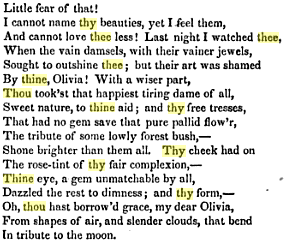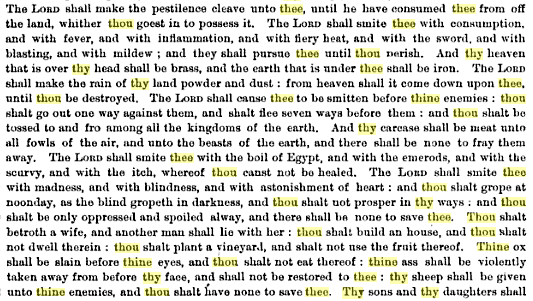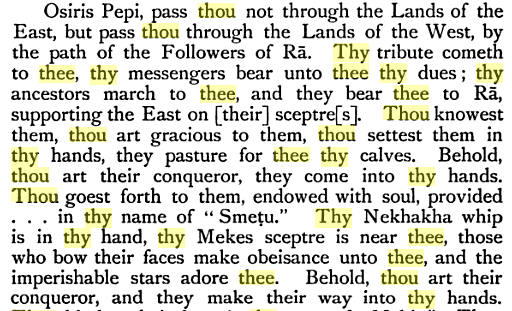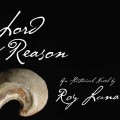Adieu to thee, thou, thy and thine? Nay, it’s hullo!
 How I weep for thee, thou singular most beauteous subject pronoun, along with thy possessive adjectives, not to mention those pronouns of thine, and I am saddened for the lack of direct and indirect object pronouns that make me miss thee and shout out to thee: why art thou gone? There was no need to see thee gone! As for the reflexive pronoun, thou sinnest against thyself when thou goest uncomplainingly into the night, without even a backward glance, sinking deeply into the darkness of oblivion.
How I weep for thee, thou singular most beauteous subject pronoun, along with thy possessive adjectives, not to mention those pronouns of thine, and I am saddened for the lack of direct and indirect object pronouns that make me miss thee and shout out to thee: why art thou gone? There was no need to see thee gone! As for the reflexive pronoun, thou sinnest against thyself when thou goest uncomplainingly into the night, without even a backward glance, sinking deeply into the darkness of oblivion.
But I want to bring thee back. We need thee! How can we function without thee? Thou providest usefulness and completeness to our utterances. It is because thou hast fled that regions of English speakers have come up with the likes of y’all and yous and yous-guys, in order to differentiate the one from the many. By thy absence, thou hast created a vacuum that needs to be filled.
“You come with me, one person, while y’all stay here, multiple people.”
“I’m inviting yous, group of friends, all except you, single ex-friend.”
Wherefore hast thou gone, Shakespearan and King Jamesian friend? For no good sense. Other languages manage to keep their singular/plural formats, which usually do double duty as familiar/formal forms: Spanish tú vs usted/ustedes/vosotros; French tu vs vous; German du vs Sie; Russian ты vs вы.
Speak to one person, your friend: tú; speak to one person, not your friend: usted. Speak to several people, your friends: vosotros; speak to several people, not your friends: ustedes. How useful is that?
Do you suppose that a democratic system did away with ye old forms of speaking? Well, cease to suppose. This eclipse of thou has been in the works since mid-Sixteenth century, and besides, England still has her monarchy, and the Queen has her privileges of birth that you mob still don’t. Perhaps it stems from the conquest of the English by the French king William (Guillaume), who in 1066 defeated Harold’s forces and, in the years that followed, replaced the English aristocracy with a French-speaking Norman one, thus leading to linguistic seepage and amalgamation. What was a lord to do, or to say, when confronted with the thou/you; tu/vous variations? One needed to show respect for one’s superiors by addressing them in the formal conjugations, whereas the superiors could show their geneality by calling their inferiors thou. Still, much ado over pronouns could lead to trouble, if one didn’t choose one’s vocabulary correctly. Imagine, toasting one’s lord using thou and thee!
“How darest thou drink to my health in such a familiar manner! Off with thy tongue!”
“Excuse me, my lord, I meant thee no harm, me Lord, I meant vous, uhm, yous, er, ye… I meant ye no harm!”
“Ye, thou usest ye, ye, with me? Thou toyest with thy lexicon, and thy abuse of proper language will land thee in the stockade!”
“Oh, my lord, no, I beseech ye-thee-vous-tu-you-y’all, mercy, my Lord, mercy!”
“Ah, well, finally, thou art French after all, since thou art thanking me!”
 Thus, my beloved, I call thee back to me, for I will not foresake thee. Thou hast always been a part of me, I who have read of thee from time immemorial. I find thee and thine useful and therefore beautiful, for the language, for our intended mutual comprehension, society needs thee still. Thou art not gratuitous, thou art not redundant, nor art thou pleonastic. And I do not find thee confusing! Thou art my beloved, and sorely missed, and I pull thee back from oblivion, to be my familiar and my singular addressee and interlocutor. I am thy champion!
Thus, my beloved, I call thee back to me, for I will not foresake thee. Thou hast always been a part of me, I who have read of thee from time immemorial. I find thee and thine useful and therefore beautiful, for the language, for our intended mutual comprehension, society needs thee still. Thou art not gratuitous, thou art not redundant, nor art thou pleonastic. And I do not find thee confusing! Thou art my beloved, and sorely missed, and I pull thee back from oblivion, to be my familiar and my singular addressee and interlocutor. I am thy champion!
“How do I love thee, let me count the ways…!”
“Thou art worthy!”
“Thou art not dead!”
Not even moribund. Just dusty from spending too much time on a bookshelf.




0 Comments